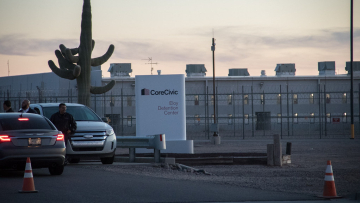Swiss watchdog accepts human rights complaint against UBS Bank over private prison investments
Ryan Brightwell, BankTrack, ryan@banktrack.org
Dana Floberg, Worth Rises, dfloberg@worthrises.org
Anna Joseph, Coalition for Immigrant Freedom, ajoseph@coalitionfreedom.org

Ryan Brightwell, BankTrack, ryan@banktrack.org
Dana Floberg, Worth Rises, dfloberg@worthrises.org
Anna Joseph, Coalition for Immigrant Freedom, ajoseph@coalitionfreedom.org
The success
The Swiss National Contact Point, a government agency, has accepted a complaint against UBS over investments it holds in two major US private prison companies, CoreCivi and GEO Group, with well-documented human rights abuses.
BankTrack's role
BankTrack filed the complaint together with Coalition for Immigrant Freedom and Worth Rises. The complaint followed advocacy towards UBS and other banks and investors, aimed at them pressuring private prison contractors to stop human rights abuses, or else divesting from those companies.
Today, the Swiss National Contact Point for Responsible Business Conduct (NCP), a governmental business and human rights watchdog, accepted a complaint by human rights groups against Swiss banking giant UBS for its investment holdings in U.S. private prison contractors CoreCivic and GEO Group. The complaint was filed by non-profits BankTrack, Coalition for Immigrant Freedom, and Worth Rises. It follows years of civil society advocacy for investors to pressure private prison contractors to stop human rights abuses, or else to divest from those companies.
The complaint, filed in January 2024, alleges that UBS breached OECD guidelines by failing to exert the influence it has over CoreCivic and GEO Group through investment in those security contractors to try to curb the human rights abuses taking place in the contractors’ facilities. Those human rights violations include forcing detained, asylum-seeking migrants and other individuals into unpaid labour–often under threats of solitary confinement–and deprivation of basic necessities such as water and food.
Passive investing, such as through index funds, has been on the rise in recent years. The OECD’s determinations on how much responsibility financial institutions have for such investments could have major impacts on the due diligence processes those institutions must routinely undertake. In UBS’ response to the complaint (summarised in the Initial Assessment), the bank argued that there is “no direct link” between its operations and human rights violations, as the bank’s shares are not actively managed but rather are held in index funds. Yet, in a win for financial accountability advocates, the Swiss NCP made clear today that such a link “cannot be excluded,” affirming the principle that passively-held investments should be part of investors’ human rights checks.
In accepting the complaint, the Swiss NCP has agreed to offer its mediation offices; if UBS agrees to participate in the mediation process, the next phase will involve a confidential dialogue between the parties. If the parties cannot reach an agreement, the Swiss NCP will examine the issues and make a final decision. The Swiss NCP will then issue a public final statement on the case, which could further clarify the human rights responsibilities that the OECD Guidelines places on banks related to passive investments.
The non-profits also filed the same complaint against Swiss National Bank (SNB) in Switzerland and Barclays and HSBC in the United Kingdom. The Initial Assessments of those complaints are still forthcoming.
This acceptance follows a 2021 case, Society for Threatened Peoples v. UBS, in which the Swiss NCP considered whether UBS had also violated the OECD Guidelines through its ties to Hikvision, a provider of modern surveillance technology linked to mass surveillance of Uyghur minorities in Xinjiang, China. That case was the first time an OECD NCP recognized the responsibility banks have for their passive investments through index funds.
Bianca Tylek, Executive Director of Worth Rises, said: “The OECD Guidelines create clear obligations for banks to ensure their investments do not contribute to human rights abuses like those regularly and conspicuously inflicted by CoreCivic and GEO Group on the people detained in their facilities. We are pleased to see the Swiss NCP accept our complaint, reiterating the important role banks play in the financial ecosystem, including their passive investments. We hope other financial institutions take note.”
Ryan Brightwell, Campaign Lead on Banks and Human Rights at BankTrack, said: “We need to see action from investors, including banks like UBS, to address their exposure to the ongoing abuses in US private prisons. We welcome the Swiss NCP’s decision to start mediation on this issue, and look forward to working constructively with UBS and other banks on how they can address their links to these abuses in line with their human rights responsibilities.”
Christine L Mendoza, Interim Executive Director at Coalition for Immigrant Freedom, said: “Accepting this complaint is a significant step in holding financial institutions accountable for their investments in entities that violate human rights. We urge UBS and other banks to recognize their responsibility to ensure that their passive investments do not contribute to the abuses of immigrants that have been occurring in private prisons. This mediation process is an opportunity for banks to clarify their human rights obligations and take meaningful action towards divestment.”
The Initial Assessment can be downloaded from the website of the Swiss NCP here.
***
Notes for editors:
Currently, about 90 percent of people in Immigration and Customs Enforcement (ICE) detention in the United States are held in facilities owned or operated by private prison corporations such as GEO Group and CoreCivic, the largest US security contractors (and whose contracts with ICE generate billions of dollars in revenue). There have been innumerable reports over the years of violence and abuse by United States security contractors against the people they detain or transport, including migrants seeking asylum who are subject to special protections under international law. In addition to copious other human rights abuses, CoreCivic and GEO Group often force detained persons to perform uncompensated labor under threat of solitary confinement, physical restraint, suspension of attorney and family visitation, deprivation of necessities like food, water and hygiene products, and negative interference with ongoing asylum cases.
The Organization for Economic Co-operation and Development (OECD) and its Guidelines for Multinational Enterprises (OECD Guidelines) impose obligations on the governments of state signatories to promote compliance among corporations operating from or within their territories. The OECD Guidelines incorporate human rights instruments such as the Universal Declaration of Human Rights, and require that all OECD member and adhering governments establish functioning National Contact Points (NCPs), government-supported offices to address cases against corporations that violate the OECD Guidelines. Complaints can be brought against companies violating human rights or against companies with business links to rights violators, such as financial institutions linked through financing or investment.
In 2019, JPMorgan Chase, Wells Fargo, Bank of America, SunTrust, BNP Paribas, Fifth Third Bank, Barclays, and PNC agreed to stop new corporate lending to CoreCivic and GEO Group under pressure from U.S. advocates, but several banks have not yet interpreted this commitment to extend to other business relationships, including investments.


